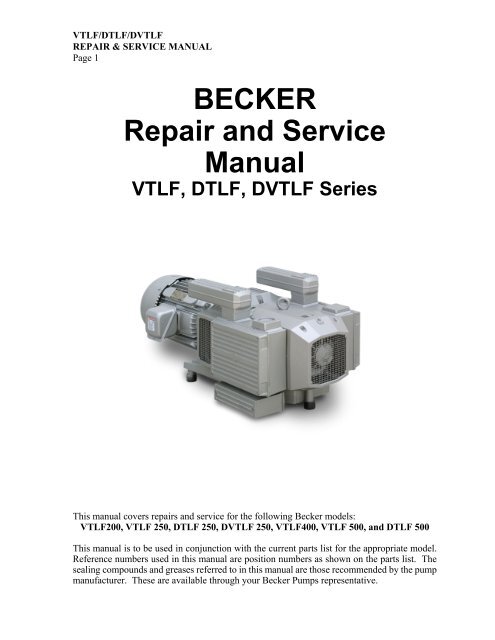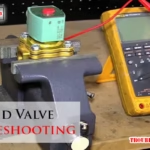Are you dealing with issues with your Becker vacuum pump and feeling stuck? Don’t worry—you’re not alone.
Whether it’s a sudden loss of performance, strange noises, or unexpected shutdowns, these problems can be frustrating and costly if left unresolved. The good news? Most Becker vacuum pump issues can be diagnosed and fixed with the right approach. In this guide, we’ll walk you through practical troubleshooting steps to get your pump back in peak condition.
If you’re ready to save time, money, and frustration, keep reading. You’re about to gain the clarity you’ve been looking for.
Credit: beckerpumps.com
Common Issues In Becker Vacuum Pumps
Becker vacuum pumps are reliable workhorses in many industries, but like any equipment, they can face occasional hiccups. Knowing how to identify and solve common issues can save you time, money, and frustration. Let’s break down the most frequent problems users encounter and how you can address them effectively.
Pump Not Starting
Nothing is more frustrating than a vacuum pump that refuses to start. This issue often stems from basic electrical problems, such as a blown fuse, a tripped circuit breaker, or loose wiring connections. Start by checking the power supply and ensuring the pump is plugged into a working outlet.
Another culprit could be a faulty motor. If you’ve ruled out electrical issues, inspect the motor for wear or damage. Regular maintenance can help prevent motor failures—when was the last time your pump had a check-up?
Reduced Vacuum Performance
Is your pump not pulling the vacuum it used to? Reduced performance could mean there’s a leak in the system. Inspect all hoses, seals, and connections for signs of wear or damage.
Clogged filters are another common cause. A dirty filter restricts airflow and lowers the pump’s efficiency. Cleaning or replacing filters regularly can keep your pump running at peak performance.
Excessive Noise During Operation
If your pump sounds like it’s auditioning for a rock concert, it’s time to investigate. Excessive noise often points to worn-out bearings or misaligned components. Listen closely—does the noise get louder as the pump runs?
Lubrication issues can also cause unusual sounds. Check the oil levels and quality. Low or contaminated oil can lead to grinding or whining noises, which are signs of deeper mechanical problems.
Overheating Problems
An overheating pump can halt your operations and lead to costly repairs. Overheating is frequently caused by poor ventilation. Make sure the pump has adequate space around it to dissipate heat.
Dirty filters and blocked air passages can also trap heat inside the pump. Inspect and clean these components regularly to prevent overheating. Is your pump running in a hot environment? Consider installing cooling measures like fans or air conditioning.
Oil Leaks And Contamination
Oil leaks can spell trouble for your vacuum pump and the surrounding equipment. Leaks often occur due to worn seals or improper assembly. Inspect the pump for visible oil stains and tighten any loose bolts.
Contaminated oil can also harm your pump’s performance. Dirty oil loses its lubricating properties, leading to increased wear and tear. Replace the oil at recommended intervals and always use the manufacturer-recommended type.
Have you faced any of these issues with your Becker vacuum pump? Staying proactive with maintenance and troubleshooting can extend the life of your pump and keep your operations running smoothly.
Causes Behind Performance Drop
Is your Becker vacuum pump not working as efficiently as it used to? Performance issues can disrupt operations and lead to costly downtime. Understanding the root causes can help you fix the problem faster and prevent future breakdowns. Let’s dive into some common culprits that might be holding your pump back.
Clogged Filters Or Inlets
Dust, dirt, and debris can accumulate in your vacuum pump’s filters or inlets over time. This buildup restricts airflow and reduces suction power. Are you cleaning or replacing filters regularly? Neglecting this simple maintenance step can lead to serious performance drops.
Imagine trying to breathe through a clogged straw—it’s frustrating and inefficient. Your pump feels the same way when filters are blocked. Check them often, especially in dusty environments, and keep them clear to ensure smooth operation.
Worn-out Vanes
The vanes in your Becker vacuum pump play a critical role in maintaining suction power. Over time, they wear down and lose their ability to create the seal necessary for optimal performance. Have you inspected them recently?
If the vanes are worn, your pump might struggle to reach the pressure levels you need. Replace worn vanes promptly to restore efficiency. Many users report immediate improvement after addressing this issue.
Improper Lubrication
Lubrication keeps your pump’s moving parts running smoothly. Using the wrong type of oil or failing to lubricate properly can lead to friction and overheating. Is your pump making unusual noises or running hotter than usual? Improper lubrication could be the cause.
Always use the manufacturer-recommended oil and follow the lubrication schedule. Skipping this step can shorten your pump’s lifespan and lead to costly repairs.
Air Leaks In The System
Even small air leaks can dramatically impact your pump’s performance. Loose connections, cracked hoses, or damaged seals can allow air to escape, reducing suction power. Have you checked your system for leaks lately?
Use a soap solution to detect leaks—bubbles will form where air is escaping. Tighten connections and replace damaged components immediately. A leak-free system ensures your pump works at its peak efficiency.
Which of these issues have you encountered? Regular maintenance and quick action can save you time, money, and frustration. The key is staying proactive and addressing problems before they escalate.
Step-by-step Troubleshooting Guide
Is your Becker vacuum pump not performing as expected? Don’t worry—you’re not alone. Regular troubleshooting can help you pinpoint issues and restore your pump to peak performance. Let’s break down the key steps you can take to get your vacuum pump back on track.
Inspecting Electrical Connections
Start with the basics. Check if the power supply is stable and all electrical connections are secure. Loose wires or faulty connections can disrupt operation and even damage the pump. Look for signs of wear, such as frayed cables or burn marks near terminals.
If you find loose connections, tighten them carefully. For damaged wires, replace them immediately to avoid further complications. A small check now can save you from a costly repair later.
Checking Oil Levels And Quality
Oil is the lifeblood of your Becker vacuum pump. Low or poor-quality oil can lead to overheating and reduced efficiency. Unscrew the oil cap and check the level using the dipstick, just like you would for a car.
Is the oil murky or dark? That’s a sign it’s time for an oil change. Use only the manufacturer-recommended oil to ensure smooth operation.
Cleaning Or Replacing Filters
Dirty filters can choke your pump’s performance. Remove the filters and inspect them for dust, debris, or blockages. A clogged filter forces the pump to work harder, which can lead to overheating.
If the filter looks reusable, clean it with compressed air. If it’s too dirty or damaged, swap it out for a new one. You’ll notice an immediate improvement in airflow.
Sealing Air Leaks
Even a small air leak can compromise your pump’s vacuum level. Check all hoses and connections for cracks or loose fittings. Listen for hissing sounds—they’re often a dead giveaway for leaks.
Seal leaks using appropriate materials like vacuum tape or replace damaged parts. Don’t overlook this step; unsealed leaks reduce efficiency and drive up energy costs.
Testing Vacuum Levels
Finally, test the vacuum levels to ensure the pump is operating correctly. Use a vacuum gauge to measure the pressure. Compare your readings with the manufacturer’s specifications.
If the levels are off, it could point to deeper issues like worn-out vanes or internal damage. At this stage, consulting a professional might be the best course of action.
By tackling each of these steps, you’re not just fixing immediate problems—you’re extending the life of your Becker vacuum pump. What’s the first issue you’ll address today?
Essential Maintenance Tips
Vacuum pumps are the backbone of many industrial processes, and keeping them in top shape is critical for smooth operations. Regular maintenance is your best tool to ensure your Becker vacuum pump stays reliable and efficient. Let’s dive into essential maintenance tips you can use to keep your system running like new.
Routine Cleaning And Inspection
Dirt and debris can silently sabotage your vacuum pump’s performance. Make it a habit to clean external surfaces and remove any accumulated dust. Check the inlet filter regularly—if it’s clogged, airflow decreases, and the pump works harder than it should.
Inspect hoses and seals for cracks or wear. A tiny leak can lead to significant efficiency losses. Use a flashlight to check hard-to-see areas, and don’t forget to inspect the oil for contamination if your pump uses it.
Replacing Worn Components
Worn parts can slow your pump down or even cause it to fail. Keep an eye on vanes, bearings, and gaskets—these are the usual suspects for wear and tear. If you notice unusual noises or vibrations, it’s often a sign that something needs replacing.
Order genuine Becker replacement parts to maintain performance. Using lower-quality components might save money upfront but could cost more in downtime and repairs later. Act as soon as you spot wear instead of waiting for a complete breakdown.
Monitoring Operating Conditions
Operating conditions can either extend or shorten your pump’s lifespan. Keep an ear out for unusual sounds like rattling or hissing. Monitor the vacuum level—if it’s below standard, it might indicate a leak or a failing component.
Pay attention to temperature. Overheating can damage internal parts, so ensure proper ventilation around the pump. If your pump uses oil, make sure it’s at the correct level and hasn’t turned dark or sludgy.
Scheduling Regular Service Checks
Don’t wait for something to go wrong before calling a professional. Schedule service checks based on the manufacturer’s recommendations. These checks often catch small issues before they turn into costly problems.
Keep a maintenance log for your pump. Note down service dates, parts replaced, and any unusual behavior. This record helps technicians understand your pump’s history and can speed up diagnostics.
Have you noticed how much easier maintenance becomes when you stay proactive? A little effort now can save you from major headaches down the line. What steps will you take today to give your Becker vacuum pump the care it deserves?
Choosing Replacement Parts
Replacing worn-out or faulty parts in a Becker vacuum pump is essential. Using the right components ensures optimal performance and prevents future issues. Selecting replacement parts requires careful consideration to maintain efficiency and durability.
Below are key factors to guide you in choosing the best replacement parts for your Becker vacuum pump.
Selecting Genuine Becker Parts
Original Becker parts are designed to fit and function perfectly. These components meet strict manufacturing standards and ensure compatibility with your vacuum pump. Using genuine parts reduces the risk of damage and extends the pump’s lifespan.
Always verify that the part has an official Becker label or mark. This ensures you are buying authentic and high-quality components.
Identifying Compatible Components
Not all replacement parts fit every Becker vacuum pump model. Check your pump’s manual or specifications to find the right components. Incorrect parts may lead to operational problems or reduced efficiency.
Identify the part number or model to match components accurately. Consult technical guides or reach out to experts for confirmation before purchasing.
Sourcing From Reliable Suppliers
Reliable suppliers provide authentic Becker parts and ensure quality. Choose vendors with a strong reputation and verified customer reviews. This minimizes the risk of buying counterfeit or substandard components.
Online stores with Becker certification are often trustworthy sources. Check for warranties or return policies to ensure a safe purchase.

Credit: www.yumpu.com
When To Seek Professional Help
Sometimes, troubleshooting a Becker vacuum pump can get tricky. While you may handle minor fixes yourself, there are situations where expert intervention is necessary. Knowing when to call in a professional can save you time, money, and headaches down the road.
Handling Complex Repairs
Not every repair is straightforward. If your vacuum pump has internal damage, like a worn-out rotor or a cracked housing, DIY fixes may worsen the problem. Complex repairs often require specialized tools and technical expertise that most of us don’t have at home.
Trying to fix these issues without the right knowledge can void warranties or create safety hazards. Instead, trust a professional who’s trained to handle such intricate tasks. Their experience ensures the repair is done right the first time.
Recurring Technical Issues
Is your vacuum pump breaking down repeatedly despite your best efforts? Persistent issues, like consistent overheating or frequent pressure drops, could indicate an underlying problem.
It’s easy to misdiagnose these recurring faults, especially if they stem from a hidden defect. A professional technician can pinpoint the root cause and provide a lasting solution, sparing you from endless trial and error.
Upgrading To A New System
Sometimes, repairs aren’t enough, and it might be time to replace your vacuum pump. But how do you choose the right upgrade for your needs? Professionals can guide you in selecting a system that matches your operational demands and budget.
They can also handle the installation, ensuring everything is set up correctly from day one. A poorly installed vacuum pump can lead to inefficiency and costly maintenance down the line. Why take that risk?
So, when should you ask for help? The answer is simple: whenever the job feels beyond your expertise. Your pump is a critical part of your operations—don’t gamble with its performance.

Credit: www.youtube.com
Conclusion
Troubleshooting a Becker vacuum pump doesn’t have to be complicated. Focus on regular maintenance and understanding common issues. This helps keep your pump running efficiently. Always check for leaks, unusual noises, or reduced performance early. Quick action prevents bigger problems down the line.
Refer to the user manual for specific guidance. If problems persist, consult a professional for help. Proper care extends the lifespan of your vacuum pump. Keep it clean, inspect it often, and replace worn parts as needed. A well-maintained pump saves time and avoids costly repairs.
Stay proactive, and your equipment will serve you well.






